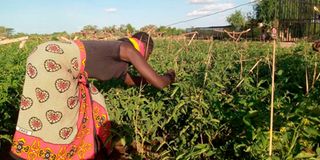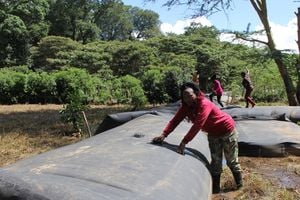Agricultural cooperatives should promote climate-smart farming

A farmer tends to her tomatoes in Turkana County. Through collective saving, farmers can invest more in climate-smart technologies and machinery for members’ use.
The COP26 meeting in Glasgow last November resolved that countries review their 2030 emissions reduction targets to close the gap to limiting global warming to 1.5 degrees Celsius.
The world leaders also agreed that developed countries deliver more resources, including funding, to help climate-vulnerable nations to adapt to the dangerous and costly consequences — like dwindling crop yields and devastating storms — of climate change.
Secure climate-sensitive farming systems require a re-evaluation of strategies, including instituting an integrated approach to managing landscapes — cropland, livestock, forests and fisheries — that address the interlinked challenges of food security and climate change. Governments must lead to ensure the different landscapes are managed in an integrated manner.
The “Kenya Climate Smart Agriculture Strategy 2017-2026” recognises the danger of climate change to sustainable development. It will adversely affect more adversely developing countries, particularly in Sub-Saharan Africa, such as Kenya, which has experienced increased frequency and intensity of extreme weather events.
Declining agricultural productivity and loss of crops, livestock, fish and investments in agriculture and increased frequency and intensity of extreme weather events are a central concern.
Vulnerable to changes
Kenya’s agriculture is predominantly rain-fed and, therefore, vulnerable to changes in temperature regimes and precipitation patterns. The country requires transformation of its agricultural systems to make them more productive and resilient while minimising greenhouse gas emissions. The role of agricultural cooperatives in this transformation cannot be overlooked as they form a critical link to (small-scale) farmers who occupy the frontline of climate change.
For (small-scale) farmers, the greatest challenge comes in the form of uncertainty in terms when, where and how much rain they can expect. Kenya has witnessed fluctuations in rainfall in recent decades as a result of changes in the global climatic conditions. Farmers’ challenges fall into three categories: Extreme weather conditions; increase in pests and diseases; and hotter temperatures.
First, farmers in Eastern and Southern Africa are already experiencing effects of extreme weather — like droughts, floods, heat waves and frost. The World Bank says with a rise of just 1.5OC, 40 per cent of crop areas that grow maize, a staple crop, may no longer be viable to do so by 2030. Yet farmers also present opportunities to mitigate climate change as they manage over 80 per cent of the world’s 500 million small farms.
If farmers collectively adopted climate-smart farming techniques like planting more trees, minimum tillage, mulching and covering crops to reduce water evaporation, harvesting water for dry season use, using energy-efficient stoves and promoting agro-forestry, it could simultaneously help alleviate poverty and mitigate climate change.
Moisture conditions
Secondly, changes in temperatures and moisture conditions can allow crop diseases and pests to expand into new areas. For example, Kenya has had an invasion of fall armyworms, which can devastate maize yields.
Lastly, average temperatures are expected to rise over the coming decades, leading to desertification and smaller harvests in Sub-Saharan Africa. According to the “State of the Climate in Africa 2019” report, much of Africa has experienced 1OC increase since 1901, leading to expansion of the Sahara desert.
In 2007, African countries began the Great Green Wall project to plant trees from Senegal in the west to Djibouti in the east by 2030. The aim of the 8,000-kilometre long, 15km wide green barrier is to hold back the desert from marching further south but only about 15 per cent of the goal has been achieved.
Finally, through collective saving, they can invest more in climate-smart technologies and machinery for members’ use to improve resilience to climate change, and offer greater access to certified agro-inputs, including drought-tolerant and disease-resistant seedlings, fertilisers and pesticides.
Prof Nyamongo, an anthropologist, Fulbright Scholar and 2022 Pelto International Award recipient, is a deputy vice-chancellor at The Cooperative University of Kenya. [email protected]. @Prof_IKNyamongo





